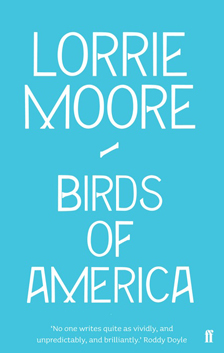Lorrie Moore: ‘Community Life’
by Katherine HillAs with most anything in life, from parents to food to clothes, I’d had plenty of experience with short stories before I really knew what they were. We read them in school (another thing experienced before it’s understood): these one- to forty-page things of fiction, usually in a photocopied packet, or an anthology containing other stories, each written by a person with a talent for words who knows something about the world.
It wasn’t until I was an adult, and trying to write stories of my own, that I began to wonder what a story actually was. Enter Lorrie Moore, whose writing seemed to answer all my questions. This was a story: a Lorrie Moore story was a story! I asked around and it turned out many writers had had a moment like this: a rather story-like epiphany of how it must be done. For some people, the muse was Anton Chekhov. For others, Raymond Carver. Or Tillie Olsen, or Alice Munro, or Jamaica Kincaid. For me, it was Lorrie Moore.
I’ve since learned that a great story writer speaks to her reader, intensely. For a brief period, writer and reader grab hold of one another through language, and some kind of transmission takes place. The writer might challenge her reader, or enlighten her, or understand her – or, if she’s very special, all three. Lorrie Moore got me on every level, and in story after story.
A representative example might be ‘Community Life’ in Birds of America. It’s about a woman named Olena who emigrates from Romania to Vermont as a child, loses her parents to a car accident as a teenager, and works as a university librarian in the Midwest as an adult. Still grieving for her dead parents, she embarks on a relationship with Nick, a former sixties radical now managing a local political campaign, who is loving but carelessly unfaithful.
‘Community Life’ has all the basic elements of a traditional Western story: character, setting, conflict. Yet its personal and social concerns are what make it interesting, and Moore’s sharp, inventive prose is what makes it great. The story is full of the systems that shape us – language, landscape, politics – and the exciting, bruising encounters we have with those systems. We see Olena, who loves verbal games, discovering that her name is an anagram for alone. We see her in bed at night, terrorised by Midwestern weather: “All through the summer, the thunderstorms set the sky on fire while she lay there, listening for the train sound of a tornado, which never came – though the lightning ripped open the night and lit the trees like things too suddenly remembered, then left them indecipherable again in the dark.” We see her submitting to a group pelvic exam after Nick’s dalliance, her own passive, and undeniably sexual way of contributing to the community from which she feels so removed: “One by one, the hands of the students entered her, or pressed her abdomen, felt hungrily, innocently, for something to learn from her, in her.
Olena’s emotional trajectory is satisfying because it is built on these mystifying encounters with language, landscape and politics, and because it is written by Lorrie Moore. Voice counts for so much in short fiction. It’s what grips us. It’s where story originates. A writer can probe the known world all she wants, but she won’t discover anything without the right sound. Neither will her reader. Moore simply has the sound: a voice that knows, questions, jokes and imagines, and one that is capable of surprise. I always forget plot and character names, but years from now, if I remember nothing else of ‘Community Life’ I will remember the tender description of the bat Nick kills in the house he shares with Olena: “The bat, she could now see, was small and light-colored, its wings folded in like a packed tent, a mouse with backpacking equipment.” And I will remember Olena wearing Nick’s clothes, an experience that helps her understand what it might be like “to make love to a woman, to open up the hidden underside of her, like secret food, to thrust yourself up in her, her arch and thrash, like a puppet, to watch her later when she got up and walked around without you, oblivious to the injury you’d surely done her.”
The full quotes, I surely won’t remember. But the backpacking mouse, the obliviousness of injury. Above all else, the voice.
 Katherine Hill was born in Washington, DC in 1982. Her fiction and non-fiction have appeared in publications including n+1, The Believer, Bookforum, Colorado Review and the San Francisco Chronicle. Her debut novel The Violet Hour was published by Scribner in July 2013 and is published in hardback by Viking and as a Penguin eBook in February 2014.
Katherine Hill was born in Washington, DC in 1982. Her fiction and non-fiction have appeared in publications including n+1, The Believer, Bookforum, Colorado Review and the San Francisco Chronicle. Her debut novel The Violet Hour was published by Scribner in July 2013 and is published in hardback by Viking and as a Penguin eBook in February 2014.
katherine-hill.com
Lorrie Moore is the award-winning author of the story collections Self-Help, Like Life and Birds of America, and the novels Anagrams and Who will Run the Frog Hospital? She teaches English at the University of Wisconsin in Madison, and is published by Faber and Faber and Vintage Contemporaries.


